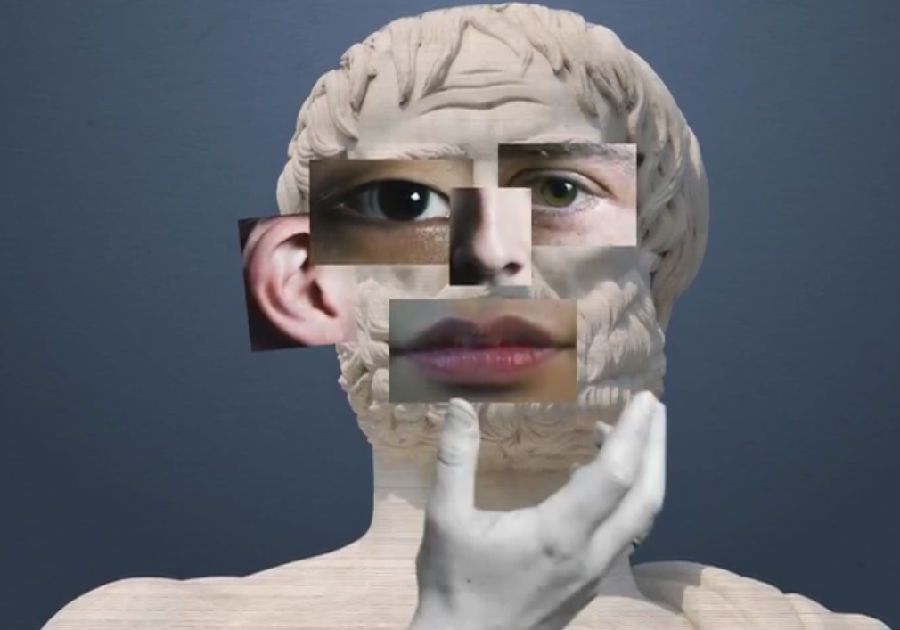Back in kindergarten we were all taught that
我们还在上幼儿园的时候,老师就教我们
there are five senses: sight, hearing, touch, taste, and smell.
人有五种感官:视觉、听觉、触觉、味觉和嗅觉
Aristotle defined these in his book De Anima.
亚里士多德在他的《论灵魂》一书中就给这些感官下过定义
He then wrote: “One might be confident that there is not another sense beside the five”
接下来他写道:“有人可能会坚信除了这五种感官之外再也没有其他感官了”
and we’ve been listing them this way ever since, but...
我们也一直都是这么列举的,但是……
Who’s to say an old greek was right?
谁说一个希腊老头说的是对的?
Our ability to “sense” is incredibly complex.
我们感觉的能力无比复杂
When Aristotle came up with his definitive list,
亚里士多德得出他的这一列表时
he linked them to visible “sense organs”
他把这些感官跟可见的“感觉器官”想联系
But modern neuroscience recognizes that there's more to it than that.
但现代神经系统科学认为情况要更为复杂
If you close your eyes and put your finger near to your forehead –
如果你闭上眼睛,把手指放在额头前——
don’t touch it.
不要挨到额头
How do you know where your finger is?
你是如何得知你手指的位置的?
It’s because you have position sense – or proprioception.
这是因为你有定位感官——或者说叫本体感受
That’s Bruce Durie, a Scottish genealogist and author who wrote about sensory perception.
这位是布鲁斯·杜里,苏格兰的一位系谱学者,他还写过感官直觉方面的著作
You can open your eyes now.
现在你可以睁开眼睛了
If you get up and walk around.
如果你站起来走动一下
Do you trip over your own feet?
你会被自己的脚绊倒吗
Hopefully not.
顺利地话,不会
Your sense of sight prevents you from walking into a wall,
视觉能够预防你走路时撞墙
but proprioception tells your brain where your feet are,
但本体感受能告诉你的大脑你的脚踩在了什么地方
so you can walk without falling over yourself.
从而你走路的时候不会被自己绊倒
And this is different from just feeling the ground under your feet.
此外,这跟单纯感受脚底的地面感觉不一样
Scientists believe this sense works with receptors in your joints, ligaments, and muscles
科学家认为,本体感受会配合关节、韧带和肌肉
to give you an awareness of your body.
让你对自己的身体有所感知
It's also why your little league coach told you to “keep your eye on the ball.”
这也是为什么你的联赛教练教你“盯着球”的原因
You didn’t need to watch where your hand was in order to catch it.
接球的时候你不用关注你手的位置
It doesn’t stop there.
手不会停在那里
There are actually some pretty extensive lists of “other” senses
实际上还有一些比较长的列举“其他”感官的清单
that vary depending on how you define them.
这些清单根据定义的不同而不同
By their popular definition, senses are restricted to five sensory organs.
按照最流行的定义来看,感官一般指五种感觉器官
But what about organs that didn’t make the cut?
但是,那些没有上榜的器官呢?

There are two sensory organs in your ear alone
你的耳朵里就有两种感觉器官
and they’re responsible for very different things.
而且他们负责的是差别很大的两种感觉
One picks up sound waves for your sense of hearing,
一种为你的听觉收集声波
and the other maintains balance or equilibrioception.
另一种则维持感受的平衡或者说是平衡感受
We can stay upright because there’s a vestibular system inside our inner ears.
我们能够直直地站着,是因为我们的内耳里有一个前庭系统
It’s made up of fluid-filled semicircular canals and small hairs that pick up movements .
前庭系统是由充满液体的半圆管道以及捕捉运动的绒毛构成
The brain combines signals from the vestibular system with other senses to maintain balance .
大脑将前庭系统和其他感觉综合起来,从而维持平衡
Try standing on one leg. Easy, right?
试试单脚站立,很简单,对吧?
Now shut your eyes .
现在闭上眼睛
It’s hard to do that with your eyes closed – at least without practice .
闭上眼睛之后单脚站立就很难了——至少没有经过训练的话是这样
That’s because vision makes it easier to balance
那是因为视觉会让平衡变得更简单
as it clarifies the orientation of the world around you .
因为视觉会使你对周围的环境有所了解
This partial reliance on vision is also why some people get motion sickness –
这种对视觉的依赖也是有些人患有晕动病的原因
when the movement you see around you
当你所看到的周围的运动
doesn’t match the signals your vestibular system is sending to your brain,
跟你前庭系统传送给大脑的信号不匹配时
you get disoriented .
你就会迷失方向
Organs aside,
除去器官不说
the list of senses really starts to expand when you define them based on receptors in the body .
如果你按照身体接收感觉的接收器来进行分类的haul,感觉的种类的确会变多
We’d arguably have to list thousands based on smell alone .
仅仅是嗅觉我们就可以很容易地列举成千上万种感官
Or we’d create subcategories like we already have for taste based on an outdated taste map .
我们也可以往细里划分,就像我们照着一种过时的味觉地图划分味觉那样
Touch can be broken down into categories too .
触觉也能往细里划分
When you hold your hand over a hot stove,
当你把手放在一个很烫的炉子上时
you feel heat without touching it .
即便你没有摸到炉子你也能感受到热
That’s thermoception –
这就是热觉
it takes an entirely different group of receptors in your skin to recognize changes in temperature .
皮肤里感受温度变化的又是另一组完全不同的接收器
We can also separate things like pressure, and pain .
我们还可以区分压力和疼痛之类的东西
These are different sensations based on different receptors that send signals to a different part of your brain .
根据往大脑发送信号的接收器的不同,感官也可以有不同的分类
Listing just 5 senses means we’re leaving out a lot of things
仅仅列举五种感觉意味着我们排除了很多
that actually keep us alive and functioning on a daily basis .
真切地维持我们的生命和日常功能的东西
And don’t even get me started on the senses we don’t have .
那些我们没有的感觉就更不要说了
So this begs the question: is teaching five senses really the best way?
那么这就引发了一个问题:教学生感官的五分法真的是最好的办法了吗
It’s just an easy shorthand .
这只不过是一条捷径而已
I think the thing about the other five – the classic ones –
我认为关于这五种感官——经典分类里的五种——
and they don’t only work that way it’s how we tend to talk about them –
它们并不是这样工作的,只不过是我们倾向于这么讨论而已——
it’s about the outside world .
重要的是外部世界
When we’re young,
小时候
learning these five senses is a really simple way to make sense of the world around us .
学习这五种感官真的是一种非常简单的帮助我们感知周围的世界的一种方法
These senses are based on external stimuli .
这些感官都是基于外部刺激产生的
And because we have visible organs to link them to,
而且,因为我们有能够将它们相匹配而且看得见的器官
they’re easy to test in a classroom .
在课堂上也很好验证
We can touch objects, hear music, see the classroom, smell a flower and taste lunch .
我们能够触摸东西,听见音乐,看见教室,闻到花香,尝到午餐
But what happens when we feel hot or cold in a room
但当我们在室内感到冷或是感到热
or if we lose balance and fall over?
又或是我们失去平衡摔倒在地又是怎样的一种情形呢?
These senses are hard to ignore
这些感官都很难被我们忽视
but they can’t be classified as the ones we learn .
但我们无法将它们归类到我们学到的那几种里面
We don’t have a lot of conscious awareness of how complicated our physical bodies are
我们并没有很强烈的意识到我们的身体
when they move about the world and the processing involved in that .
在周遭的世界中活动以及我们身体对此作出的反应有多复杂
Because as soon as you do start to think about that
因为一旦你开始考虑这个问题
then you have to start thinking about these issues around sensation within the body .
那你就不得不开始思考与我们身体内的这些感官相关的这些问题
Learning five basic senses might be the right place to start .
学习五种基本的感觉或许是一个正确的开端
But next time you stub your toe -- think about that sensation –
但下一次你踩到脚趾头的时候——想一想那种感觉——
it's one of the many senses your kindergarten teacher never told you about .
那种感觉是你幼儿园老师从来不会告诉你的感觉之一












